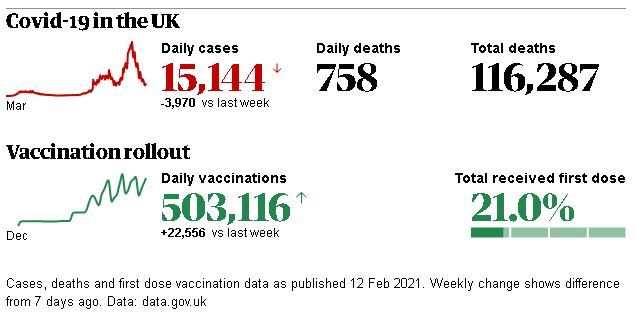Border staff not briefed about even basics of Covid protection system starting on Monday, says union
Immigration officials expected to enforce a mandatory quarantine intended to protect the UK from new coronavirus variants have not been briefed on even the basics about how the system will work, little more than 48 hours before it begins, the Guardian has been told.
The Immigration Services Union (ISU), which represents many of the Home Office’s immigration officers, said that before the start on Monday of the new policy, staff had not been told if they would be expected to check for arrivals who had not properly declared their status, or when and how those obliged to quarantine would be taken to hotels.
“They’ve had no information at all,” said Lucy Moreton, the general secretary of the ISU. “They can watch the media, read statements from ministers, but that’s pretty much it.”
From Monday, travellers arriving in the UK from 33 “red list” countries where potentially vaccine-resistant variants are common will be forced to spend 10 days in a hotel room quarantining at their own expense.
There have already been teething issues with the system. Throughout most of Friday people were still unable to secure hotel rooms, with an official booking portal unavailable due to what the health department called a “minor technical issue”.
Moreton said her members had not yet been told whether they needed to check the passports and tickets of people arriving, in case arrivals from red list countries had not declared their status.

She said: “It’s one thing if someone has declared it, prebooked their quarantine, that’s relatively simple. But to what extent are Border Force going to be checking to be sure people have been honest?”
If immigration officials did have to do the checks, she said, it could greatly increase queues in airports, with people mixed together dangerously. The union already has 80 members normally based at Heathrow airport who have been ordered to self-isolate.
Moreton said that while it had been announced that new quarantine management services would deal with red list arrivals being transferred to hotels, her members did not yet know if this would happen at the aircraft, or if they would queue at immigration with other people.
She said: “I recognise the complexity of the logistics of all this, but this is all really difficult for the staff, more so than the other changes. We’re hearing a lot of concern from people who are concerned about encountering someone who has been in a red list country and hasn’t declared it. Could they face abuse? Are they expected to detain them?”
Yvette Cooper, the Labour MP who chairs the Commons home affairs committee, said: “It is Friday afternoon and I understand Border Force still haven’t been given the operational guidance on how the hotel quarantine system will work from Monday. This isn’t good enough.
“We urgently need to know what arrangements have been made to ensure that those from high-risk countries about to go to hotels aren’t queueing with people about to get on the tube or train home.
“Chaotic long queues with no social distancing in place have the potential to be super-spreading events that will undermine the very measures being introduced.”
There have also been questions about the government’s decision to allow those quarantining to leave their room once a day for exercise. This is not permitted in the Australian model, introduced early last year, which has nonetheless still seen cases of Covid spreading to staff or other travellers.
The official UK government guidance for the quarantine plan says those quarantining will be allowed out of their rooms to exercise “only with special permission from hotel staff or security – this is not guaranteed”.
Health officials say each hotel will receive detailed guidance on how to handle this in a Covid-secure way, based on public health input, and that corridors and other communal areas must have proper ventilation.
Gabriel Scally, visiting professor of public health at Bristol University and a member of the Independent Sage group of scientists, said much would depend on how well staff were able to operate any exercise system safely.
“Obviously, the gold standard would be everybody staying in their rooms all the time, and anything other than that, obviously, increases the risk,” he said. “It is a system that relies upon obsessive detail.”
However, Scally said, even keeping people permanently in a room was also not without risk, pointing to an example in Australia where it is believed the virus was passed between travellers when two people opened room doors across a corridor at the same time, to receive meals.
“Every little thing all adds up together, every little additional risk is an additive risk: their transport to the hotel, how they get moved through the hotel to the rooms, all of that sort of thing,” he said.
“Like most custodial places, whether prisons or hospitals, if you get the virus into a place where people are confined in relatively small places in large numbers, it can be devastating.”
A Home Office spokesperson said: “We are taking decisive action at the borders and every essential check – from pre-departure testing to the passenger locator form – will help prevent the importing of new coronavirus variants into the UK.
“The new measures strengthen a regime that already includes a number of stringent rules: it is illegal to travel abroad for holidays and other leisure purposes, people need negative Covid tests before arriving in the UK, and we have strict travel bans in place for countries where there is a risk from known variants.
“Border Force operational guidance is constantly updated to reflect the ever-changing environment and staff are supported on how to apply new guidance.”















